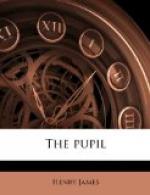“They’re not particularly keen about my being helped, and they delight in thinking of you as theirs. They’re tremendously proud of you.”
“I’m not proud of them. But you know that,” Morgan returned.
“Except for the little matter we speak of they’re charming people,” said Pemberton, not taking up the point made for his intelligence, but wondering greatly at the boy’s own, and especially at this fresh reminder of something he had been conscious of from the first—the strangest thing in his friend’s large little composition, a temper, a sensibility, even a private ideal, which made him as privately disown the stuff his people were made of. Morgan had in secret a small loftiness which made him acute about betrayed meanness; as well as a critical sense for the manners immediately surrounding him that was quite without precedent in a juvenile nature, especially when one noted that it had not made this nature “old-fashioned,” as the word is of children—quaint or wizened or offensive. It was as if he had been a little gentleman and had paid the penalty by discovering that he was the only such person in his family. This comparison didn’t make him vain, but it could make him melancholy and a trifle austere. While Pemberton guessed at these dim young things, shadows of shadows, he was partly drawn on and partly checked, as for a scruple, by the charm of attempting to sound the little cool shallows that were so quickly growing deeper. When he tried to figure to himself the morning twilight of childhood, so as to deal with it safely, he saw it was never fixed, never arrested, that ignorance, at the instant he touched it, was already flushing faintly into knowledge, that there was nothing that at a given moment you could say an intelligent child didn’t know. It seemed to him that he himself knew too much to imagine Morgan’s simplicity and too little to disembroil his tangle.
The boy paid no heed to his last remark; he only went on: “I’d have spoken to them about their idea, as I call it, long ago, if I hadn’t been sure what they’d say.”
“And what would they say?”
“Just what they said about what poor Zenobie told me—that it was a horrid dreadful story, that they had paid her every penny they owed her.”
“Well, perhaps they had,” said Pemberton.
“Perhaps they’ve paid you!”
“Let us pretend they have, and n’en parlons plus.”
“They accused her of lying and cheating”—Morgan stuck to historic truth. “That’s why I don’t want to speak to them.”
“Lest they should accuse me, too?” To this Morgan made no answer, and his companion, looking down at him—the boy turned away his eyes, which had filled—saw what he couldn’t have trusted himself to utter. “You’re right. Don’t worry them,” Pemberton pursued. “Except for that, they are charming people.”
“Except for their lying and their cheating?”




